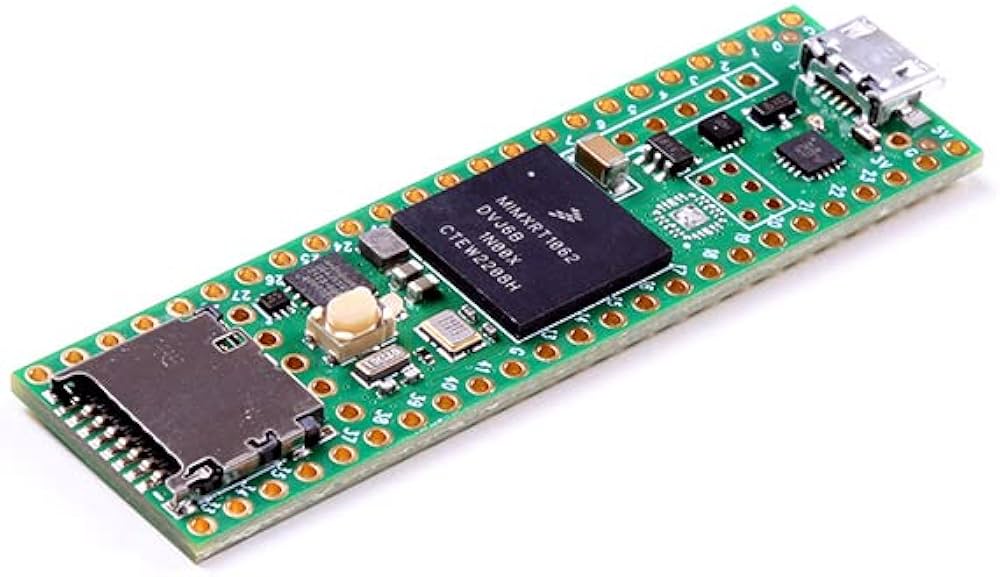Features:
- ARM Cortex-M7 at 600 MHz
- Floating point math unit, 64 & 32 bits
- 7936K Flash, 1024K RAM (512K tightly coupled), 4K EEPROM (emulated)
- QSPI memory expansion (2 extra RAM/Flash chip locations)
- USB device & host at 480 Mbit/sec
- 55 digital I/O pins, 35 PWM output pins
- 18 analog input pins
- 8 serial, 3 SPI, 3 I2C ports
- 2 I2S/TDM and 1 S/PDIF digital audio port
- 3 CAN Bus (1 with CAN FD)
- 1 SDIO (4-bit) native SD Card port
- 32 general-purpose DMA channels
- Cryptographic acceleration & random number generator
- RTC for date/time
- Programmable FlexIO and Pixel Processing Pipeline
- Peripheral cross triggering
- Power On/Off management
Processor:
- Performance: ARM Cortex-M7 offers high-speed real-time computing.
- Dual-Issue Superscalar Architecture: Executes 2 instructions per clock at 600 MHz depending on compiler optimization.
- Floating Point Unit: 32-bit float matches integer speed; 64-bit double runs at half speed.
- Tightly Coupled Memory: Single-cycle access to memory via ITCM & DTCM buses.
- Cache: Two 32K caches for instructions and data.
- Branch Prediction: Reduces loop and branch overhead.
- Digital Signal Processing: DSP instructions accelerate signal processing and Fourier transform.
Pinouts:
Teensy 4.1 brings all general-purpose I/O pins to breadboard-friendly pads, with a total of 55 I/O pins. 42 are accessible using a solderless breadboard. A pinout reference card is included (front/back).

Comparison to Teensy 4.0:
| Feature |
Teensy 4.1 (No Ethernet) |
Teensy 4.0 |
| Ethernet |
None |
None |
| USB Host |
5 Pins with power management |
2 SMT Pads, SDIO (4-bit data) |
| Micro SD Socket |
Yes |
8 SMT Pads |
| PWM Pins |
35 |
31 |
| Analog Inputs |
18 |
14 |
| Serial Ports |
8 |
7 |
| Flash Memory |
8 MB |
2 MB |
| QSPI Memory |
2 chips + program memory |
Program memory only |
| Breadboard Friendly I/O |
42 |
24 |
| Bottom SMT Pad Signals |
7 |
16 |
| SD Card Signals |
6 |
0 |
| Total I/O Pins |
55 |
40 |
Features:
- ARM Cortex-M7 at 600 MHz
- Floating point math unit, 64 & 32 bits
- 7936K Flash, 1024K RAM (512K tightly coupled), 4K EEPROM (emulated)
- QSPI memory expansion (2 extra RAM/Flash chip locations)
- USB device & host at 480 Mbit/sec
- 55 digital I/O pins, 35 PWM output pins
- 18 analog input pins
- 8 serial, 3 SPI, 3 I2C ports
- 2 I2S/TDM and 1 S/PDIF digital audio port
- 3 CAN Bus (1 with CAN FD)
- 1 SDIO (4-bit) native SD Card port
- 32 general-purpose DMA channels
- Cryptographic acceleration & random number generator
- RTC for date/time
- Programmable FlexIO and Pixel Processing Pipeline
- Peripheral cross triggering
- Power On/Off management
Processor:
- Performance: ARM Cortex-M7 offers high-speed real-time computing.
- Dual-Issue Superscalar Architecture: Executes 2 instructions per clock at 600 MHz depending on compiler optimization.
- Floating Point Unit: 32-bit float matches integer speed; 64-bit double runs at half speed.
- Tightly Coupled Memory: Single-cycle access to memory via ITCM & DTCM buses.
- Cache: Two 32K caches for instructions and data.
- Branch Prediction: Reduces loop and branch overhead.
- Digital Signal Processing: DSP instructions accelerate signal processing and Fourier transform.
Pinouts:
Teensy 4.1 brings all general-purpose I/O pins to breadboard-friendly pads, with a total of 55 I/O pins. 42 are accessible using a solderless breadboard. A pinout reference card is included (front/back).

Comparison to Teensy 4.0:
| Feature |
Teensy 4.1 (No Ethernet) |
Teensy 4.0 |
| Ethernet |
None |
None |
| USB Host |
5 Pins with power management |
2 SMT Pads, SDIO (4-bit data) |
| Micro SD Socket |
Yes |
8 SMT Pads |
| PWM Pins |
35 |
31 |
| Analog Inputs |
18 |
14 |
| Serial Ports |
8 |
7 |
| Flash Memory |
8 MB |
2 MB |
| QSPI Memory |
2 chips + program memory |
Program memory only |
| Breadboard Friendly I/O |
42 |
24 |
| Bottom SMT Pad Signals |
7 |
16 |
| SD Card Signals |
6 |
0 |
| Total I/O Pins |
55 |
40 |

